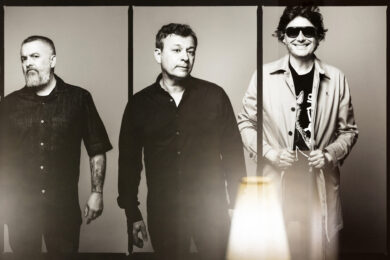Once the most of dogmatic of bands, today there is only one credo remaining that the Manic Street Preachers still abide by: “Walkers Crisps fucking suck.” Where once, says James Dean Bradfield over the phone, “we had directives every week, policy initiatives. ‘Only wear tight white jeans, nothing baggy or with labels on. Never write a love song,’” crisps are now the only place he can summon that old didactic fire. “We will not have Walkers in our studio. We will not have them in our houses, and we will not have them in our dressing rooms. They’re the fucking evil empire.” The more he speaks, the less sure I am that he’s joking. “I’ve always liked Gary Lineker, I like him on Match Of The Day, I even liked him when he went to Nagoya Grampus as a footballer, but I hold it against him that he’s the face of Walkers.”
For what it’s worth, Bradfield is a Golden Wonder man “all fucking day, every fucking day”. Although, he admits, he has a lot of time for Tavern Snacks, Brannigans, Real Crisps – “a bit corporate, but they’ve still got a sense of themselves” – and service station favourite Slabs, their ill-fated attempt at egg and chips flavour notwithstanding. He says that the day he found out that Brannigans had a flavour called smoked ham and pickle, “not just ham and pickle, smoked ham and pickle,” gave him the same feeling as when Nicky Wire and Richey Edwards told him they were writing lyrics for a song called ‘Archives Of Pain’: “That’s going to be fucking banging.”
Through a career that’s seen the Manics fire off in manifold directions to varying results, there was always a sense of consistency to their process, even after Wire took on sole songwriting duties following Edwards’ disappearance 30 years ago this week. “Nick would give me a title and it would ignite something,” Bradfield says. “Hanging something around a concept gave us direction, it made us excited.” They stuck by “credo, tenets carved into slabs of stone” at all costs, even when writing new ones would contradict the old, leading to “self-inflicted shrapnel wounds” like when “we turned against ourselves on Lifeblood, or self-destructed after the massive success of Everything Must Go and This Is My Truth Tell Me Yours.”
Since at least 2013’s Rewind The Film, however where Wire wrote and Bradfield sang “I can’t fight this war anymore / time to surrender, time to move on” on ‘This Sullen Welsh Heart’, the band have been grappling with the idea of just how much longer they can keep this up. When I interviewed him four years ago, Wire jokingly referred to it as their period of “managed decline.” After 2014’s pan-European epic Futurology, their final exercise in singular, conceptual songwriting, came 2018’s scattershot Resistance Is Futile, on which the band clung to cultural touchstones like driftwood after a shipwreck, while 2021’s The Ultra Vivid Lament delved further inwards to grappling with a wider existential crisis, amplified in part by the death of Wire’s parents.
“We’re not attached to any MO or concept any more,” Bradfield says of Critical Thinking. It even contains an “almost love song”. The shift is partly the product of age, he says, noting with a hint of grimness that his birthday next month will see him closer to 60 than 50. That’s coupled with a world that’s no longer just confusing, but untethered from reality. “When you live in age where reality resembles fiction. The game is up,” Bradfield says. “Everything is looser now. I find it hard to read anything theoretical now, because I just think that it’s all been dismantled. I don’t believe anything I hear anymore.” The result is a record that’s energetic, high-tempo and often euphoric. Critical Thinking reflects a sense of “freedom,” says Bradfield, “The freedom of still being alive as a band in the time that we’re living. By that, I mean that you buy certain freedoms if you’re on your 15th album, and that one of them is to break your own rules.”
He wrote the lyrics alone for three of the songs on the record – the most he’s ever contributed to a single Manics LP – which stand among the warmest the band has yet produced. One of them, ‘Being Baptised’, is about 14 hours Bradfield spent basking in the genius of the late Allen Toussaint, when the two – alongside John Grant, of whom he’s also a huge fan – were grouped together for an episode of BBC Four’s Songwriter’s Circle in 2011. “I felt like the odd one out. When John Grant sits behind the piano he has a purpose, he’s digging and finding and retrieving. And Allen Toussaint – you could just see there was an innate rhythm in the way he played, so self-contained, so confident that he was beyond arrogance.” Touissant’s presence brought back memories of his mother, Sue. “She loved his song ‘Holy Cow’, and I remember her showing me his songwriting credit on ‘Southern Nights’ by Glen Campbell, which is a song that can always pick me up if I’m feeling really crestfallen, or even desolate.” It was the first time, he says, he understood the intimate connection between a songwriter and a singer that would later be so central to The Manics. Reverting to unabashed fandom, he bombarded Toussaint with questions. “Sometimes you do that and you realise they’re glazing over, but he didn’t. Although I saw from the look in his eyes that he didn’t want me swearing, so I stopped. He still had his suit on and he looked so classy. He instilled just the right amount of fear, admiration and respect.” It was when their conversation turned to Hurricane Katrina that Toussaint – born and raised in New Orleans – came up with a line that stuck. “He said, ‘You didn’t know if God was trying to baptise you or drown you,’” Bradfield recalls. “But ultimately he decided on baptised. Katrina didn’t destroy his faith, which I was impressed by, I’ve got to say.”

A paraphrase of Toussaint’s words form the song’s lyrical spine, but for its soaring and jangling riff Bradfield looked back to that childhood introduction to ‘Southern Nights’ via his mother, appropriating some of Campbell’s melody. She also defines ‘Brushtrokes Of Reunion’, which is written about one of the paintings she produced in art therapy during the latter stages of her chemotherapy treatment, as a means to take focus away from pain. “It’s probably the object in my life which has the biggest power over me, apart from a guitar and maybe some photographs,” Bradfield says. “The song is about how you can fall under the spell of a physical object that reconnects you with somebody, it’s as simple as that.” After his mother’s death from cancer in 1999, Bradfield wrote 2001’s ‘Ocean Spray’, about the cranberry drink he’d bring for her when she was in hospital, but says that the act of processing his grief, whether through song or otherwise, remains an open-ended process. “I hate the idea of closure. You learn to try and ignore loss, perhaps, or you try and get something out of loss and turn it into something positive, but you never get closure. That song talks about how you reconnect with purely loving somebody that had a gigantic influence on your life, and also it reignites the bitterness of her not being here, not teaching my kids the same things she taught me. That painting does a lot of things. It comforts me, it reignites bitterness, but it doesn’t bring anything to closure.”
He is reluctant when I press for details about the painting itself. “It’s a flower,” he says when asked what it depicts. “It’s in my life,” when I ask whether he has it on display in his home. “I feel very resistant to tell you, for some bizarre reason. I realise I’ve turned it into too much of a solid object. I like the idea that it’s mine, and I realise that I’ve given that away.” He pivots quickly to its recording instead, how Sean Moore, Manics drummer and Bradfield’s cousin (“virtually a brother”), laid down the drums over Bradfield’s demo version in two takes having never heard the song before. “That’s as important as writing the song, when the musician just takes hold of the thing and reignites it,” he says. “It exploded like sunflower seeds into the atmosphere when he played on it. It was amazing.”
The knottiness of our conversation about ‘Brushtrokes Of Reunion’ belies something else about Critical Thinking – that while there was freedom to the way the band approached the record, what they came out with on the other side remains complex. Just as that painting brings Bradfield comfort as much as bitterness, so too does the album on which it appears.
In press material accompanying the announcement of Critical Thinking, Wire defined it as “a record of opposites colliding… There are crises at the heart of these songs.” In contrast to the tenderness of Bradfield’s songwriting – and the largely uplifting energy of a number of the album’s instrumentals throughout, the songs that Wire has penned are altogether more spiky. The opening title track, one of three to feature Wire on vocals (like Bradfield’s lyrical credits, three Wire vocals is also a record number for a Manics LP) is a barrage of modern grievances set to gothic stomp: “Net neutrality / Smart meters / Smart water / Smart fucking motorways / Body positivity / Believe in yourself / Imposter syndrome / Fuck that!” Its repeated refrain – “What happened to your critical thinking?” – feels directed by Wire to himself as much as it does outwards. Closer ‘One Man Milita’, which he also sings, ends the record on a note of all-out despair. “I don’t know what I am for / But I know what I am against / I’m sickened to death by men / I’m bored to death with myself.”
While Bradfield speaks of feeling liberated by the Manics’ departure from dogma, Wire seems to be struggling with a resultant lack of firm foundation. He told an interviewer last year that while the album “has a lot of energy… I don’t feel particularly energised.” Bradfield laughs when I put this apparent contradiction to him. “That’s because he’s spent all his fucking energy! He’s done a new painting exhibition, a solo album not so long ago, and he still runs around the stage more than most bassists.” He concedes, though, that they’re very different songwriters. “I think the limited amount of poetry that I’m capable of will be destroyed by any anger. I can express anger in actions and deeds, but to express it in words is something I don’t think I’m capable of. I couldn’t express those emotions without it falling into doggerel. Nick is good – not just good, fucking amazing – at being angry and still making it poetic. That’s what The Clash did to us – even on a song like ‘Death Or Glory’, despite a line like ‘he who fucks nuns will later join the church,’ there’s a poeticism there.”
Perhaps, then, the biggest opposites that collide on Critical Thinking are really Bradfield and Wire themselves – a juxtaposition intensified by the way in which each of them has taken more of a step into the other’s respective ‘territory’ of songwriting and singing. “At the moment I have enough hope left in me, or enough ability to ignore what’s going around me and focus on something which is good. Perhaps Nick is not quite in that place at the moment,” says Bradfield. “So there is an opposite there.” The collision makes for a contradictory and multifaceted album, but also provides its central spark when they come together. For instance, Bradfield’s decision to resurrect ‘Being Baptised’, a song he’d actually started over a decade ago, came when he saw how Wire was carving out the sublime melancholia of ‘Hiding In Plain Sight’, the third song and first single on which the bassist takes over lead vocals. “I was enjoying just being the guitarist, trying to imagine I was Peter Buck or Johnny Marr. I could see how he was going back to it, refining and refining and refining, and I just thought ‘Wow, if he’s putting that much into this, what am I doing?’”
A record of collisions, contradictions and confusions it might be, but what Critical Thinking shows is that even when the sloganeering, the concepts, the cultural touchstones are stripped away, and whatever the varying effects of that might be on the Manics as individuals, there’s a deeper force still that keeps them together as a three – a connection that goes deeper than any dogma. Perhaps that force is something as simple as pure enjoyment. “I saw Kim Deal accept a prize a while back, and she said ‘I always just go with what Neil Young says: find a chord and fucking dig in.’ That’s the only philosophy I can understand these days. If you’re on the beach, you’re not gonna find an answer, so stop thinking you’re some kind of slashed-down-bogof-cut-price Bergman. Just be happy you’re on the beach, that you remembered your flask of coffee, your corned beef and pickle sandwich wrapped in foil, and a pack of mother fucking Golden Wonder.”
Manic Street Preachers’ new album Critical Thinking is released on 7 February via Sony



